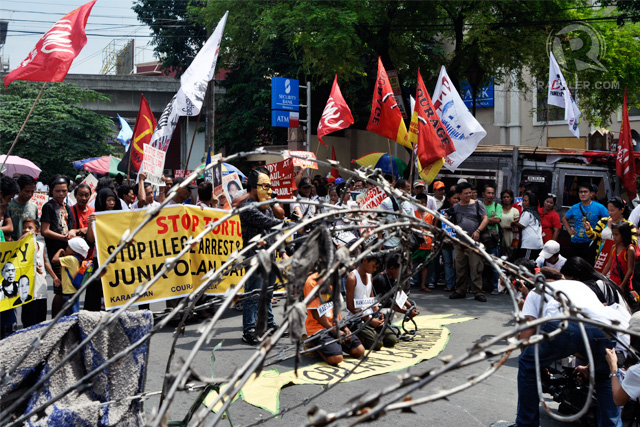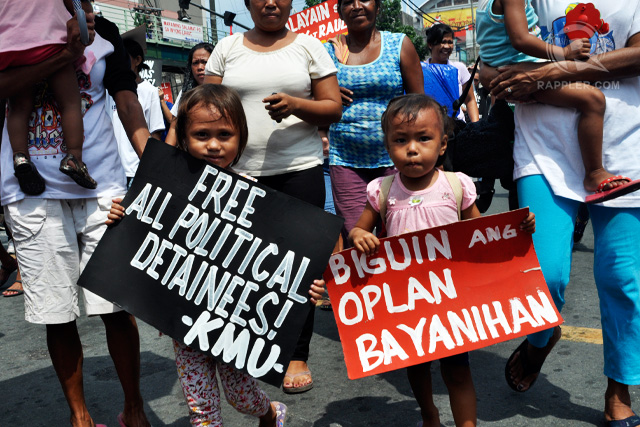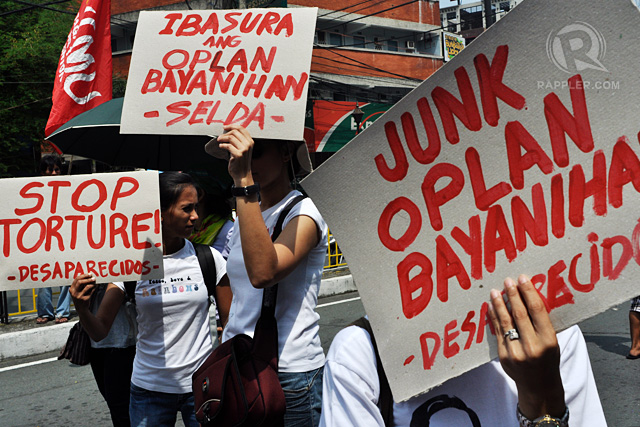SUMMARY
This is AI generated summarization, which may have errors. For context, always refer to the full article.

MANILA, Philippines – Torture and illegal detention are still being committed by government forces in the Philippines, and they must be stopped, human rights groups said on the occasion of the United Nations International Day in Support of Torture Victims, June 26.
Around 200 activists and human rights advocates marched from Avenida to Mendiola to protest the Aquino administration’s alleged use of torture to extract information from illegal detainees.
Torture is still prevalent despite the administration’s good governance campaign, according to Karapatan chairperson Marie Hilao-Enriquez, a victim of torture during the Martial Law years.
“No matter how the Aquino government denies the use of torture, state security forces in the Armed Forces of The Philippines (AFP) and the Philippine National Police (PNP) resort to and apply it to their victims, inside and outside prison,” Enriquez said.
Members of the non-governmental organization Karapatan led the rally attended by militant organizations including Desaparecidos, Kilusang Mayo Uno, and Bayan.
Torture incidents
Citing a few cases, Karapatan and Desaparecidos maintained that torture and enforced disappearances are happening nationwide.
In Quezon City, security guard Rolly Panesa was reportedly mistaken for a top-ranking leader of the Communist Party of the Philippines (CPP). He was taken to Camp Vicente Lim in Canlubang, Laguna, where he was detained and allegedly tortured.
On February 28, 2012, ten soldiers of the 87th infantry brigade of the Philippine Army (IBPA) in Samar allegedly tortured suspected gun owners Richard Oblino, a 25-year-old farmer, and 16-year-old nephew Orlan.
Meanwhile, Cesar Garganta of Macalelon, Quezon was beaten up for 3 hours by soldiers of the IBPA. The soldiers insisted that Garganta was a member of the New People’s Army (NPA).

Anti-torture law
During the first half of the Aquino administration, Karapatan claimed it has documented 76 incidents of torture. These numbers registered more than half of the 128 recorded cases under former president Gloria Macapagal-Arroyo’s administration, the group said.
Families of Desaparecidos for Justice secretary-general Lorena Santos said that 16 cases of disappearances have been recorded.
“In fact, two incidents of enforced disappearances were reported right after the enactment of the Anti-Enforced or Involuntary Disappearance Act of 2012,” Santos added.
Enriquez further accused the government of violating its own laws.
“The Anti-Torture Law…has not prevented the government to use torture to extract information from detainees or abducted persons,” she added.
Criminalizing torture
Karapatan and Desaparecidos accused the government of using Oplan Bayanihan, the government’s counter-insurgency program, as a tool to illegally detain suspects.
“The government cannot fool the people by simply dishing out pro-human rights hype in media…Aquino cannot dismiss the torture victims as isolated cases,” Enriquez said.
Rappler tried to get the side of the Palace but still has not gotten a reply as of late Wednesday evening.
The Anti-Torture Law of 2009 was enacted to criminalize torture and other inhuman treatment and punishment of persons. It seeks to eliminate impunity and abuse of power in the Philippines.
The bill took 23 years in the House of Representatives before it was enacted into law.
On December 21, 2012, President Benigno Aquino III signed the Desaparecidos Bill into law, making the Philippines the first country in Asia to have such a legislation. The bill makes the crime of enforced disappearance punishable by life imprisonment.

Lessened cases
Commission on Human Rights (CHR) chairperson Etta Rosales in an interview with Rappler admitted that cases of torture are still occuring in the country.
“Nobody’s denying that. We all know that it’s still happening,” she added.
Rosales, however, maintained that the reported cases of violation were already lessened.
“The cases have gone down and we have evidence…from the start of the Aquino government to the present,” Rosales said.
Rosales also debunked the human rights groups’ accusations on the AFP.
“Ask for their evidence. Hindi puwedeng daldal lang nang daldal pero walang evidence,” Rosales said. (Ask for their evidence. They can’t just make allegations without evidence.)
Rosales maintained that the fight against torture is a continuous process.
“We cannot get rid of that immediately…we are making progress,” she concluded.
Enrique, on the other hand, stressed that Filipinos must do their part in condemning and stopping such violations of human rights.
“The people must remain ever vigilant of the intensification of fascist attacks by this government just like the struggle the people waged against the fascist attacks of former dictator Marcos,” Enriquez added. – With reports from Mark Demayo/Rappler.com
Add a comment
How does this make you feel?
There are no comments yet. Add your comment to start the conversation.